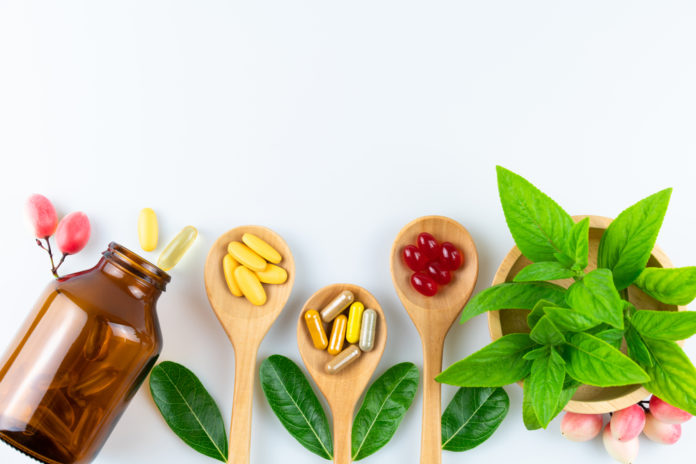The immune system is one complex, powerful line of defense. In short, it protects the body from foreign, harmful substances.
An unbalanced immune system functions can lead to infections, allergies, autoimmune disorders, and so on. The goal is to keep immune responses balanced to ward off these illnesses and infections.
Immune health can be bolstered by making healthy lifestyle changes, including diet. People may turn to vitamins, herbal medicines, and other dietary supplements as well.
We investigate whether “immune-boosting” ginger teas, vitamin capsules, and such are really worth your time, effort, and money.
Best Supplements to Boost the Immune System
While there is no one single immune system booster, these 20 supplements are worth exploring.
1. Folic Acid
Folic acid is the synthetic form of folate, a B vitamin that plays a crucial role in DNA and protein synthesis.
Though mostly observed in animal studies, a severe folate deficiency can negatively impact immune responses.
Food sources of folate: eggs, spinach, beef liver, lentils, breakfast cereals, oranges, cantaloupes, beans
2. Iron
Iron is well-known for oxygenating blood, though the mineral also is fundamental for developing a healthy immune system. Too much iron, though, may increase the risk of infections and other negative health consequences.
That being said, maintaining an iron balance can help lead to normal immune responses in the body.
Food sources of iron: beef, turkey, fish, leafy greens, quinoa, soy, beans, lentils
3. Selenium
The potent and powerful antioxidant properties of selenium can lead to a stronger immune system.
Selenium deficiency, compared to adequate selenium intake, may lead to weaker immune responses.
Food sources of selenium: brazil nuts, turkey, pork, beef, tuna, pinto beans, shiitake mushrooms, barley
4. Vitamin A
Vitamin A supplementation shows to be beneficial when one is deficient. But evidence shows exceeding normal levels may have negative health consequences.
Too much of the vitamin may inhibit the body’s trained immunity, therefore increasing susceptibility to infection
Food sources of vitamin A: apricots, carrots, squashes, mangoes, papayas
5. Vitamin B6
Vitamin B6, or pyridoxine, is involved in over 100 essential chemical reactions in the body.
Such vital reactions include playing a vital role in immune function, specifically with estrogen and testosterone.
Food sources of vitamin B6: fortified breakfast cereal, salmon, chicken, bananas, avocadoes, beef liver, brewer’s yeast, spinach, peanut butter
6. Vitamin B12
Also known as cobalamin, vitamin B12 regulates DNA and RNA, amongst many other functions.
The vitamin is essential for folate metabolism and immune responses much like vitamin B6.
Food sources of vitamin B12: animal products such as meat, poultry, fish and shellfish, with lesser amounts in dairy products and eggs
7. Vitamin C
Vitamin C is arguably the most well-known “immune-system booster” for a number of reasons.
The vitamin helps stimulate white blood cells, key immune cells that help the body fight against infections. It also supplies powerful antioxidants which can counter damage produced by free radicals.
Regular vitamin C supplementation may reduce the duration of respiratory infections, including acute colds.
Food sources of vitamin C: oranges, apples, kiwis, bell peppers, currants, peaches
8. Vitamin D
Vitamin D is noteworthy for its classic effects on calcium and bone maintenance. However, the fat-soluble vitamin also plays a role in immunity.
Vitamin D deficiency has been shown to increase susceptibility, or likely to be harmed, to infection.
Food sources of vitamin D: beef liver, egg yolks, cheese, shrimp, salmon, tuna
9. Vitamin E
Vitamin E acts as a powerful antioxidant helping to protect cells against damage.
Supplementing with vitamin E may maintain the immune system by positively impacting immune cell responses.
Food sources of vitamin E: almonds, peanuts, sunflower seeds, vegetable oils, leafy greens, fortified breakfast cereals
10. Zinc
Zinc is an essential mineral for reproducing white blood cells and wound healing.
Zinc supplementation likewise shows to decrease oxidative stress and generate inflammatory cytokines involved in immune responses.
Food sources of zinc: oysters, beef, chicken, pumpkin seeds, peas
11. Protein Shakes
Protein is important for a number of reasons, including strong immune function. The macronutrient helps produce antibodies, which helps the body fight against foreign invaders that could trigger inflammation and infection.
While protein shakes and supplements are not for everyone, they are a convenient option to help meet protein needs.
Food sources of protein: Protein is found in a variety of foods, including animal meats, beans, nuts, and seeds. Veggies also contain protein in trace amounts.
12. Garlic
Garlic not only effortlessly enhances the flavor of many dishes, but may help strengthen immune health.
While mostly restricted to animal studies, garlic does show to offer anti-inflammatory properties and positively stimulate immune cells.
13. Ginger
Often prepared in ginger tea, shots, and other concoctions, the pungent plant offers antiviral and anti-inflammatory properties.
Ginger shows to increase the largest antibody, therefore leading to stronger antibody response and protection against infections.
14. Mushroom Supplements
Mushroom supplements are as the name suggests, supplements prepared with various kinds of mushrooms. They are often sold in the forms of teas, capsules, and powders.
These mushroom supplements claim to be packed with antioxidants and other medicinal ingredients that may strengthen the immune system.
Research does show people who ate a cooked shiitake mushroom every day for four weeks strengthened their immunity.
15. Probiotics
Probiotics are good, live microorganisms shown to keep the gut healthy. Probiotics are likewise helpful in protecting from foodborne illnesses and preventing colds and infection.
Taking probiotic supplements appears to provide beneficial effects for a number of different conditions. True probiotic supplements should feature names like Lactobacillus and Bifidobacterium on the ingredient label.
Food sources of probiotics: yogurt, kefir, sauerkraut, and kombucha
16. Echinacea
Echinacea is a commonly sought out herb to boost the immune system. WebMD details taking certain echinacea products during initial cold symptoms can modestly reduce symptoms of the common cold.
Other research shows vitamin C, zinc, and Echinacea may help shorten the length of colds by a day or so.
17. Licorice
Let us preface: Not the sugary bag of candy, but rather licorice as an herb.
Licorice contains hundreds of beneficial compounds that offer antiviral, antimicrobial, anti-inflammatory, antitumor and other activities.
18. Curcumin
Curcumin, the chemical providing the vibrant color of turmeric, is suggested to reduce inflammation, combat against infection.
Curcumin is the main active compound in turmeric. It has powerful anti-inflammatory properties, and animal studies indicate that it may help improve immune function
19. Milk Thistle
Milk thistle is a medicinal herb often used to treat conditions of the liver and gallbladder. The plant offers antioxidant and immunostimulatory properties as well.
Such positive impacts can help increase immune responses to infectious diseases and other illnesses.
20. Elderberry Syrup
Elderberry syrup is a vastly explored natural remedy for various health conditions, including heart disease, the flu, and a cold.
Some research shows elderberry syrup may shorten the duration of the flu and cold, along with reducing symptom severity.
So, Should You Take Immune-Boosting Supplements?
At the end of the day, supplements are meant to supplement a balanced diet. And as outlined, those “immune-boosting supplements,” particularly the vitamins and minerals, are abundant in food.
All-in-all, eat a balanced diet with whole grains, fruits, vegetables, lean protein, and healthy fat sources. Offering variety helps ensure the body is equipped with adequate nutrients to support a healthy body and immune system. This, in turn, can lower the risk of developing illness during cold and flu season.
Other ways to stay healthy year-round include washing your hands, exercising regularly, managing stress, and prioritizing sleep.
References:
Arreola R, Quintero-Fabián S, López-Roa RI, et al. Immunomodulation and anti-inflammatory effects of garlic compounds. J Immunol Res. 2015;2015:401630. doi:10.1155/2015/401630
Dhur A, Galan P, Hercberg S. Folate status and the immune system. Prog Food Nutri Sci. 1991;15(1-2):43-60. Review. PubMed PMID: 1887065.
Hemilä H, Douglas RM. Vitamin C and acute respiratory infections. Int J Tuberc Lung Dis. 1999 Sep;3(9):756-61. Review. PubMed PMID: 10488881.
Lee G, Han S. The Role of Vitamin E in Immunity. Nutrients. 2018;10(11):1614. doi:10.3390/nu10111614.
Maggini S, Pierre A, Calder P. Immune Function and Micronutrient Requirements Change over the Life Course. Nutrients. 2018;10(10):1531. doi:10.3390/nu10101531.
Mahassni SH, Bukhari OA. Beneficial effects of an aqueous ginger extract on the immune system cells and antibodies, hematology, and thyroid hormones in male smokers and non-smokers. Journal of Nutrition & Intermediary Metabolism. 2019;15:10-17. doi:10.1016/j.jnim.2018.10.001.
Prasad AS. Zinc in Human Health: Effect of Zinc on Immune Cells. Molecular Medicine. 2008;14(5-6):353-357. doi:10.2119/2008-00033.prasad
Soyano A, Gómez M. [Role of iron in immunity and its relation with infections]. Arch Latinoam Nutr. 1999 Sep;49(3 Suppl 2):40S-46S. Review. Spanish. PubMed PMID: 10971835.
Wang L, Yang R, Yuan B, Liu Y, Liu C. The antiviral and antimicrobial activities of licorice, a widely-used Chinese herb. Acta Pharmaceutica Sinica B. 2015;5(4):310-315. doi:10.1016/j.apsb.2015.05.005.








